

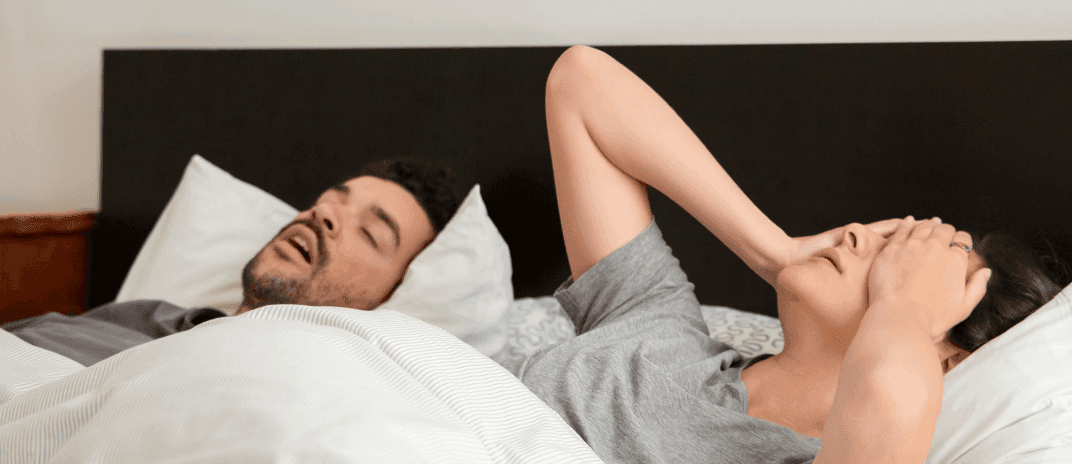
Does your husband snore so loud that you can’t seem to fall asleep? Don’t worry, this is a common problem shared by many females. Snoring is quite a common issue experienced by 45 percent of us at some point in our life. Moreover, 25 percent of the people are permanent snorers.
Sleeping with snorers is never easy. While there is no way to completely stop snoring, there are multiple things you can try to tackle your husband’s snores and snatch some peaceful catnaps when sleeping next to your snoring spouse!
There are many reasons why your husband could be snoring loudly. It could be because of his nasal and throat structure, excess weight and lifestyle factors. In some cases, it could be due to chronic health conditions like sleep apnea.
The nightly habit of heavy snoring could be associated with a more severe problem- obstructive sleep apnea. Almost 75 to 95% of OSA sufferers experience snoring. To know if your bed partner is suffering from sleep apnea, it is important to get checked and diagnosed by a medical professional.
Besides snoring, a typical symptom of sleep apnea is also when you stop breathing for at least 10 seconds per episode. So, it is something to closely monitor as well.
An easy way out is to download a sleep tracker like ShutEye®, which will analyze your husband’s sleep at night, and generate a detailed report about sleep quality, along with a recording. Moreover, its AI algorithm examines the report, too, thus asking you to “see a doctor” if needed!
Snoring, a common nocturnal symphony, is typically caused by the vibration of soft tissues in the throat and mouth during breathing. This melodic disturbance occurs when the airflow encounters an obstruction or narrowing in the air passages, leading to the fluttering sound we recognize as snoring. Several factors contribute to this phenomenon, including nasal congestion, which hinders smooth airflow, and the position in which one sleeps—lying on the back often exacerbates snoring.
Additionally, excess weight can contribute to the accumulation of fatty tissues around the neck, increasing the likelihood of airway constriction. Consuming alcohol or sedatives before bedtime relaxes muscles, including those in the throat, intensifying the vibrations that result in snoring.
While snoring is often benign, persistent and loud snoring may indicate underlying health issues such as sleep apnea, emphasizing the importance of its evaluation for both restful sleep and overall well-being.
Snoring can significantly impact the quality of sleep, leading to sleep deprivation for both the snorer and their partner. When one’s partner snores loudly, it can be challenging to fall asleep and stay asleep through the night. A study in 2003 showed hearing loss in partners of snorers over time.
Another result of snoring is a disrupted and fragmented sleep pattern, preventing individuals from achieving a good night’s sleep. This constant interruption can lead to daytime fatigue and reduced alertness.
Moreover, the snorer’s health may also be affected, as chronic snoring is often associated with sleep apnea, a condition that poses serious health risks. In some cases, couples resort to sleeping in different rooms to address this issue, but it’s essential to consider seeking medical advice and exploring solutions to improve sleep quality and overall well-being.
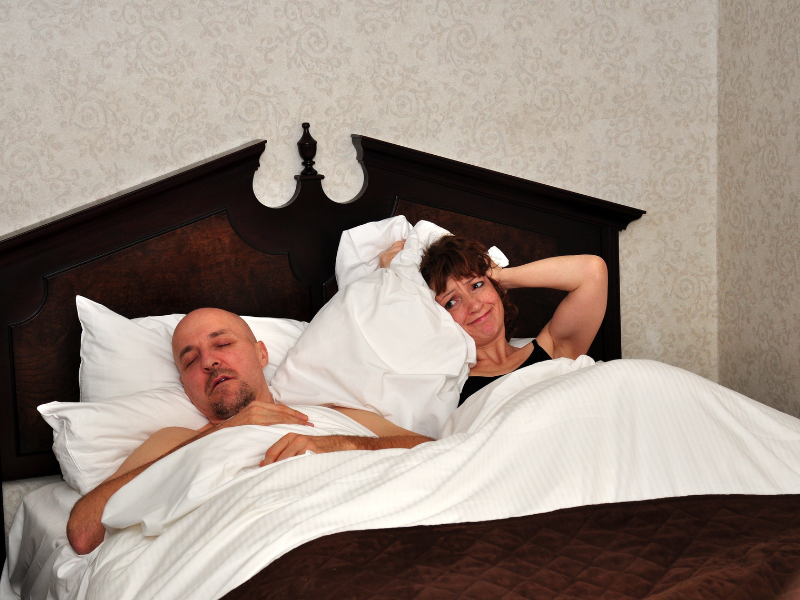
The effects of snoring extend beyond the realm of physical health; they can also strain the emotional bonds within a relationship. When one partner’s snoring consistently disrupts the other’s sleep, it can lead to frustration, resentment, and even arguments. Sleep-deprived individuals may become more irritable and less patient, which can negatively impact communication and intimacy in a relationship.
In fact, snoring is one of the leading causes of divorce worldwide. In Finland, one in three partners of snorers reported unhappy relationships due to loud snoring.
This is why, it’s crucial for couples to address snoring as a shared concern rather than solely the snorer’s issue. Seeking solutions together, such as consulting a healthcare professional or exploring lifestyle changes, can not only improve sleep but also strengthen the bond between partners.

The struggle to sleep with the cranks and crankles of a snoring spouse is real. Research showed that partners of snorers wake up nearly 21 times an hour due to the loud sounds! Treatment for snoring can bring many benefits, not just for the snorer but also for their bed partners.
However, before consulting a specialist, we recommend trying out the following strategies that may help you and your snoring partner enjoy better sleep.
One of the easiest and most effective ways to instantly stop your partner’s snoring is not to let them sleep on their back.
Although sleeping on your back is the ideal sleep position, it’s the opposite in case of snoring and sleep apnea.
When they lie on their back, the tongue, and soft palate collapse, resulting in blocked airways and thus snoring.
There are different things you can do to change your partner’s position like:
If you don’t want to invest in an anti-snore pillow, you can also put an additional pillow under his head.
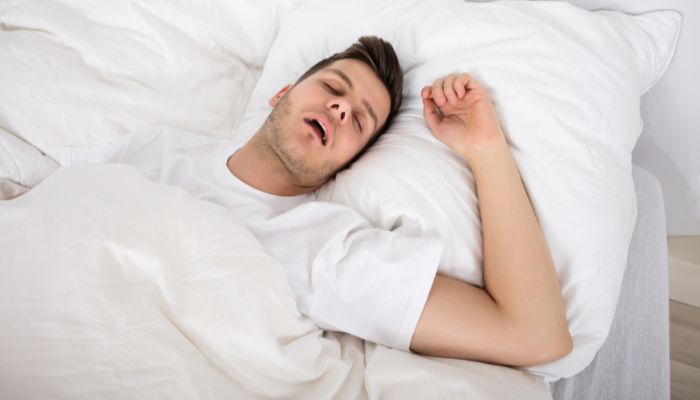
White music has soothing tones that can blend with the loud rasps of your partners, turning them into soft, audible frequencies that lulls everyone to sleep.
It can actually work for both you and your husband.
You can either buy a white noise machine or download a white noise app.
ShutEye® has a long list of soft, mind-relaxing white music, like the sounds of chirping birds, waterfall, ocean waves, etc., to relax your mind and help you sleep.
Another way out to address the health concern of snoring is to help your partner with weight loss. Shedding off excess weight can significantly reduce snoring and improve overall health. It reduces pressure on the neck and throat, thereby facilitating smooth breathing and opening air passageways. Numerous studies have shown that losing 6 to 8 pounds of extra stubborn weight can dramatically reduce snoring intensity, making it an effective method to reduce snoring and promote better health.
An easy way to cope with your husband’s snores is to stuff your ears with earplugs. From soft foam earplugs to high-quality silicone ones, you have a variety to choose from.
However, if you don’t like the idea of slipping earplugs, you can buy noise-canceling headphones to downplay your partner’s snoring.
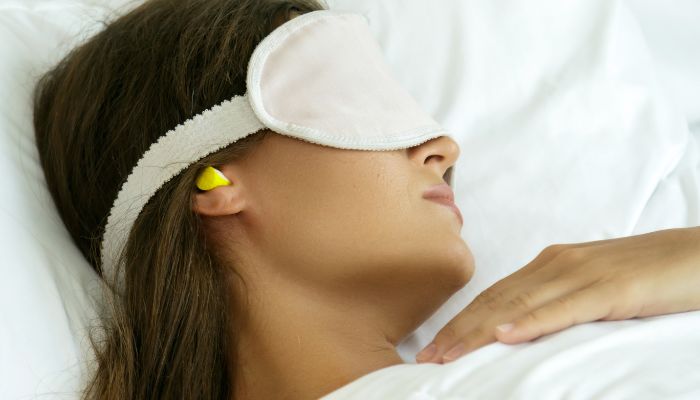
Ensure your husband doesn’t consume alcohol for at least 4 hours before sleeping.
Drinking alcohol and taking sedatives relax our body muscles, including the throat and neck muscles.
Snoring occurs when air passageways are blocked due to nasal congestion or any other reason.
So, when you consume alcohol, your jaw and throat muscles become extremely relaxed; hence you can’t keep up with cleaning the air passageways, thus leading to snoring.
Dehydration makes the mucus in the throat far more viscous, leading to a narrowed passageway and a stickier soft palate. As a result, symptoms of snoring further increase.
Therefore, make sure your husband remains well-hydrated throughout the day. It is recommended that a man should have 16 cups of water daily.
Last but not least, you can buy some nasal strips for your husband. These strips pull the sides of your nose that open the air passage. As a result, the air flows through the nose and throat easily, resulting in less snoring.
You can also buy a nasal dilator which works pretty much the same way by pulling the nostrils.
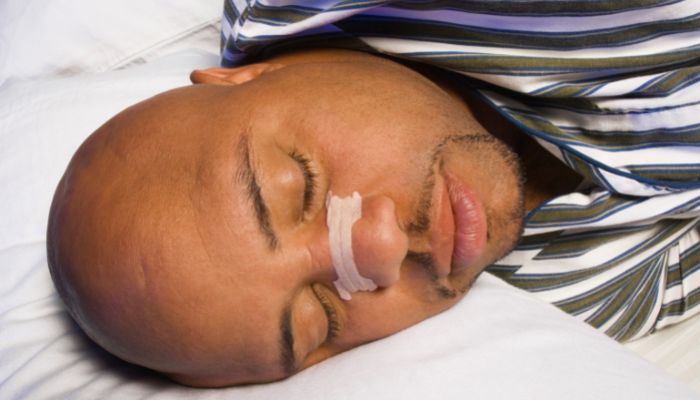
If none of the above anti-snoring strategies works and your husband snores as before, it could be an indication that the underlying causes are more complex and require further attention. In these instances, open and honest communication with your partner about snoring and its potential impact on your sleep quality. Recommend to your partner some anti-snoring devices. If you still don’t detect any discernible pattern or notice any reduction in your partner’s snores, recommend a doctor’s checkup.
Before scheduling a doctor’s appointment, you might want to explore some effective anti-snoring devices that your husband can try, which could potentially provide relief:
The last and most crucial step is to recommend a doctor’s appointment to check your partner’s health. While occasional snoring is common, chronic and loud snoring can sometimes be a sign of an underlying medical condition, such as sleep apnea or nasal congestion. Encouraging your husband to see a healthcare professional ensures a thorough assessment of his snoring. It can potentially lead to a customized treatment plan that can significantly improve his sleep patterns and overall health. Taking this step is not only about a quieter night’s rest but also about prioritizing his and your well-being for the long term.

Slumbering peacefully alongside a snoring husband can be a real challenge. We discovered in this blog that snoring itself can have various causes, including factors such as alcohol consumption, excessive weight, or even, potential underlying health issues. This is something to be checked if it is too excessive.
Before your doctor’s appointment, we suggest trying the ShutEye® app for free. This sleep and snore tracking tool can help you keep tabs on your husband’s well-being by easily monitoring snoring. Additionally, this app assists doctors in analyzing patients’ snoring patterns, making it a valuable tool for healthcare professionals.
John Hopkins Medicine (N.d.) Snoring [online]. Available at: https://www.hopkinsmedicine.org/health/conditions-and-diseases/snoring
Burgos-Sanchez, C., Jones, N. N., Avillion, M., Gibson, S. J., Patel, J. A., Neighbors, J., Zaghi, S., & Camacho, M. (2020). Impact of Alcohol Consumption on Snoring and Sleep Apnea: A Systematic Review and Meta-analysis. Otolaryngology--head and neck surgery : official journal of American Academy of Otolaryngology-Head and Neck Surgery, 163(6), 1078–1086. Available at: https://doi.org/10.1177/0194599820931087
Chen, W. C., Lee, L. A., Chen, N. H., Fang, T. J., Huang, C. G., Cheng, W. N., & Li, H. Y. (2015). Treatment of snoring with positional therapy in patients with positional obstructive sleep apnea syndrome. Scientific reports, 5, 18188. Available at: https://doi.org/10.1038/srep18188
Maimon, N., & Hanly, P. J. (2010). Does Snoring Intensity Correlate with the Severity of Obstructive Sleep Apnea? Journal of Clinical Sleep Medicine : JCSM : Official Publication of the American Academy of Sleep Medicine, 6(5), 475-478. Available at: https://www.ncbi.nlm.nih.gov/pmc/articles/PMC2952752/
Sardesai, M. G., Tan, A. K., & Fitzpatrick, M. (2003). Noise-induced hearing loss in snorers and their bed partners. The Journal of otolaryngology, 32(3), 141–145. Available at: https://doi.org/10.2310/7070.2003.40256